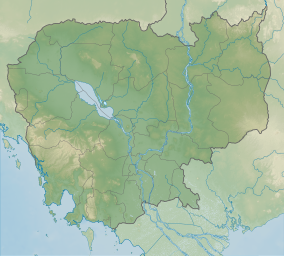Kulen Promtep Wildlife Sanctuary is one of the largest protected areas in Cambodia and was set aside to protect the critically endangered, possibly extinct Kouprey. It was created by royal decree in 1993.[2][3]
| Kulen Promtep Wildlife Sanctuary | |
|---|---|
| Khmer: ដែនជម្រកសត្វព្រៃគូលែនព្រហ្មទេព | |
IUCN category IV (habitat/species management area)[1] | |
| Location | Siem Reap Province and Preah Vihear Province, Cambodia |
| Coordinates | 14°01′03″N 104°31′28″E / 14.0174°N 104.5245°E |
| Area | 4,068.25 km2 (1,570.76 sq mi)[1] |
| Established | 1993[1] |
| Governing body | Ministry of Environment |
Kulen Promtep Wildlife Sanctuary is one of the last places on the planet where the giant ibis, a critically endangered species, can be found. It is also the national bird of Cambodia. The sanctuary is supported with the help of private donations as well as through an ethical eco-volunteer program.[4]
Geography
editIt is located in the northern plains of Cambodia, near the border to Thailand.
The sanctuary contains lowland forest as well as the largest swamp in the country.[5] It is part of the Northern Plains Dry Forest Priority Corridor.[6][7]
References
edit- ^ a b c Protected Planet (2018). "Kulen Promtep Wildlife Sanctuary". United Nations Environment World Conservation Monitoring Centre. Retrieved 26 Dec 2018.
- ^ "Royal decree on Establishment of Natural Protected Areas (1993 ) - OD Mekong Datahub". data.opendevelopmentcambodia.net. Retrieved 2022-06-21.
- ^ "Royal decree on Establishment of Natural Protected Areas". Open Development Mekong Datahub. 1993. Retrieved 2021-05-28.
- ^ "Kulen Prum Tep Wildlife Sanctuary, Oddar Meanchey Activities, Oddar Meanchey Travel Guide, Cambodia Travel Guide, Cambodia Tourist Attraction | Cambo Tours & Travel". www.cambotours.com. Retrieved 2021-04-13.
- ^ "Provincial and Rural Infrastructure Project (PRIP) World Bank (KH-27510), March 9, 2003" (PDF). World Bank. Retrieved 2009-09-16.
- ^ "ICEM, 2003. Cambodia National Report on Protected Areas and Development. Review of Protected Areas and Development in the Lower Mekong River Region". Asian Development Bank. Archived from the original on May 18, 2008. Retrieved 2009-09-16.
- ^ "Northern Plains Dry Forest" (PDF). ICEM. Archived from the original (PDF) on 2008-11-19. Retrieved 2009-09-16.
External links
edit- Map of protected areas in Cambodia
- The Cambodia Wildlife Sanctuary
- Reducing Forest Clearance through Sustainable Land Management in Kulen Promtep Wildlife Sanctuary and Preah Vihear Protected Forest, Preah Vihear (KHM/07/13)
